- Home
- John Scalzi
We Only Need the Heads thd-3 Page 3
We Only Need the Heads thd-3 Read online
Page 3
“I don’t think he swallowed it to save it,” Wilson said. “I think he swallowed it because they were being overrun and he didn’t have time to destroy it any other way.”
“What was on the chip?” Tomek said.
“A bunch of daily status reports,” Wilson said. Lee frowned at this, clearly not seeing how that would matter. “It’s not what data were on the chip that was important,” Wilson continued. “It was the fact that data were saved in a memory structure that’s proprietary to BrainPals. The fact it exists implies someone was using a BrainPal. The fact the BrainPal exists implies this is more than just a wildcat colony.”
“We need to tell Captain Augustyn about this,” Lee said.
“He’s the captain,” Tomek said. “He probably already knows.”
“If he already knew, he probably wouldn’t have let me order you to examine these two,” Wilson said. “No matter what my security level. No, I think this is going to be as much of a surprise to him as it is to us.”
“So we tell him,” Lee said. “We tell him, right?”
“Yes,” Wilson said. “He’ll send a skip drone detailing what we’ve found. And I expect that immediately thereafter we’ll get new orders, telling us that it’s no longer just an extraction job.”
“What will it be now?” Lee asked.
“A cover-up,” Tomek said, and Wilson nodded. “Destroy any evidence this was anything but a wildcat colony.”
“We’re supposed to be destroying all the evidence anyway,” Lee said.
“Not just down there,” Wilson said. He pointed to the Ivanoviches. “I mean turning these two-and their BrainPals-into a fine powder. Not to mention obliterating any information on what we just found out, and that data card we found. And if these two really were still active in the CDF, I suspect they’ll be posthumously demoted for not blowing their own heads off with a shotgun.”
Lee went to speak with Captain Augustyn; Tomek stored the bodies. Wilson wandered toward the officers mess to get a cup of coffee. As he did so, he pinged his BrainPal’s message queue and found there was a message there from Hart Schmidt. Wilson smiled and prepared for a delightful dose of Schmidt’s special brand of wan neuroticism. He stopped smiling when Hart noted he’d been assigned to be Ambassador Abumwe’s right-hand man for the Bula negotiations and that Sub-Ambassador Ting’s personality was like that one time on Phoenix Station he and Wilson had met up with that other Bula.
“Shit,” Wilson said. There’s no way that Hart put that phrasing in that sentence coincidentally.
Wilson thought about it for several minutes before muttering, “Fuck it,” composing a note and encrypting it. Then with his BrainPal he took an image of his coffee, created a steganographic picture with it and the encoded note, addressed it to Hart and sent it off to the data queue for transmission on the next skip drone, which given the bombshell Lee was dropping into Captain Augustyn’s lap at the moment would probably go out almost instantly.
Wilson wasn’t under the impression that his sleight-of-hand encoding of the message into the image of the coffee would stay unnoticed forever. What he was hoping for was that it would stay encrypted long enough that Hart could do whatever he needed with the information before it got found out.
“Hopefully that won’t take too long,” Wilson said, to his coffee. His coffee was mute on the subject. Wilson slurped some of it and then called up the data he’d transferred from Vasily Ivanovich’s data card into his BrainPal. They were indeed entirely pedestrian reports on colony life, but Wilson had already found something important in there. He didn’t want to miss anything else. He suspected he didn’t have all that much time left to go through the data before he was ordered to delete all of it.
Schmidt didn’t know what strings Ambassador Abumwe had to pull to get her way, but she pulled them. Across the table from her and Schmidt were Anissa Rodabaugh, chief of the mission for the Bula negotiations, Colonel Liz Egan, the liaison between the Colonial Defense Forces and the Department of State, and Colonel Abel Rigney, whose exact position was not known to Hart but whose presence here was nevertheless slightly unsettling. The three of them eyed Abumwe coolly; she returned the favor. No one was paying attention to Schmidt, and he was fine with that.
“We’re here,” Egan said, to Abumwe. “You have five minutes before you and Ambassador Rodabaugh have to get back to it. So tell us why you so urgently needed to see us all.”
“You haven’t been entirely forthcoming with me about this wildcat colony on Wantji,” Abumwe said. Schmidt noted the clipped tone that Abumwe’s voice took on when she was especially irritated; he wondered if it was noticeable to anyone else at the table.
“In what way?” Egan asked.
“In that it’s not a wildcat colony at all, it’s an under-the-radar Colonial Defense Forces outpost,” Abumwe said.
This received about ten seconds of silence, with Rodabaugh, Egan and Rigney studiously not looking at one another. “I’m not entirely sure why you think that is,” Egan said.
“Are we going to waste the next five minutes with this sort of bullshit, Colonel?” Abumwe said. “Or are we actually going to talk about how this is going to affect our negotiations?”
“It’s not going to affect the negotiations at all-,” Rodabaugh said.
“Really,” Abumwe said, cutting her off. Schmidt noted the chagrin on Rodabaugh’s face at this, but she and Abumwe were technically of the same diplomatic rank, so there was little she could do about it. “Because, Anissa, I have a Bula sub-ambassador I’ve been talking to for the last day who I am almost entirely certain knows more about this so-called colony than I do. I think as a result I’m being led down a very short pier. I think when I get pushed off, the entire negotiation is going to go down with me. If I fail at a negotiation because of my own failures, I accept that. If I fail because I’m being screwed by my own side, that I will not accept.”
Colonel Rigney, who had been silent to this point, turned to Schmidt. “Your friend Harry Wilson’s on the Tubingen,” he said, to Schmidt. “I just checked through my BrainPal. He’s the one who’s feeding you information.”
Schmidt opened his mouth, but Abumwe reached out to touch Schmidt on the shoulder. This as much as anything else shocked Schmidt into silence; he couldn’t remember another time Abumwe had physically touched him before. “If Hart or Harry Wilson have done anything, it’s been on my orders,” she said.
“You ordered him and Wilson to essentially spy on a Colonial Defense Forces mission,” Rigney said.
“I reminded them of their obligation to help me achieve our goals as diplomats,” Abumwe said.
“By spying on the Colonial Defense Forces mission,” Rigney repeated.
“I appreciate the attempt to run out the clock by distracting me into a side discussion, Colonel Rigney, but let’s not,” Abumwe said. “I repeat: We have a military mission on a Bula world. I’m almost certain the Bula we are negotiating with are aware of it.”
“What’s your proof of that?” Rodabaugh asked.
“Nothing hard,” Abumwe said. “But I know when people aren’t negotiating in good faith.”
“That’s it?” Rodabaugh said. “You have a feeling? You’re dealing with an alien species, for Christ’s sake. Their whole psychology is entirely different.”
“And that doesn’t matter at all, because in fact we have an illegal military outpost on this alien species’ planet,” Abumwe said. “If I am wrong, then we lose nothing. If I am right, however, then we risk the failure of the entire process.”
“What do you want from us, Ambassador?” Egan asked Abumwe.
“I want to know what’s really going on,” Abumwe said. “It’s bad enough that I went into negotiations having to deal with the possibility that the Bula would discover we snuck a military ship into their territory to remove an attacked wildcat colony, but at least I could spin that if I had to. There is no way to spin a CDF ship coming to the aid of a covert military installation.”
“It wasn’t a covert military operation,” Rigney said, leaning forward.
This got Egan’s attention. “Are you really going to do this, Abel?” she asked, turning to Rigney.
“She already knows more than she should, Liz,” Rigney said. “I don’t think a little context is going to matter at this point.” He turned back to Abumwe. “It really is a wildcat colony,” he said.
“A wildcat colony with CDF soldiers in it,” Abumwe said. The skepticism in her voice was impossible to miss.
“Yes,” Rigney said. “Since the Conclave has restricted us and other unaffiliated species from colonizing, we’ve been dropping a few CDF members into wildcat colonies. The rest of the colonists don’t know. We modify their bodies to look and act like natural human bodies, but keep their BrainPals in. They record data and send it along occasionally. We recruit CDF members with a background in technical work so they usually end up being in control of their colonies’ communications systems.”
“To what end?” Abumwe asked.
“We want to see how the Conclave responds to wildcat colonies,” Rigney said. “Whether it sees them as a threat, whether they respond to them the same way as an official colony, and whether ultimately wildcat colonies-or colonies that give the appearance of being wildcat colonies-are a way we can keep expanding our presence without having a conflict with the Conclave.”
“And you thought colonizing a planet already claimed by another species was a smart thing to do,” Abumwe said.
Rigney spread his hands. “We don’t pick the planets,” he said. “We just put our people into the colony undercover.”
“How many of your people were on Wantji?” Abumwe asked.
“We typically put in a couple of people,” Rigney said. “Most wildcat colonies are small. We’ll put in one for every fifty colonists or so.” He turned to Schmidt. “How many did your friend Wilson wash up?”
Schmidt glanced over at Abumwe, who nodded. “Two, sir,” he said.
“That sounds about right,” Rigney said. He settled back in his chair.
“What do we do about this?” Abumwe asked.
“And by ‘we,’ you mean ‘you,’” Rigney said.
“Yes,” Abumwe said.
“We don’t do anything,” Egan said. “The Bula haven’t brought it up to us.”
“We’re not going to be the ones to bring it up to them,” Rodabaugh said. “If they do ask about the wildcat colony, then we tell them that as soon as we found out about it, we moved to remove them-so quickly that we didn’t ask permission first, so sorry. We’ll be out of there before then.”
“And if they find out about the CDF members among them?” Abumwe asked.
Rigney pointed at Schmidt. “We have them,” he said. “We have them both. More specifically, we have their heads, where their BrainPals are.”
Abumwe gawked at the three of them. “You’re joking, right?” she said. “The Bula are not that stupid.”
“No one said they are stupid,” Rigney said. “But all our intelligence suggests that the Bula don’t know the wildcat colony was there, and they weren’t the ones who attacked it. We’re going to proceed with the negotiations as they are.”
“And if they ask me directly about it? Contrary to all expectation they might,” Abumwe said.
“Then you don’t know anything about it,” Rodabaugh said.
“To be clear, you’re asking me to lie to the Bula,” Abumwe said, to Rodabaugh.
“Yes,” Rodabaugh said.
“You understand I think this is a bad idea,” Abumwe said.
Rodabaugh looked annoyed with Abumwe, but it was Egan who answered. “The directive for this is coming from over all of our heads, Ambassador,” she said. “And none of us have the luxury of arguing with it.”
“Right,” Abumwe said. She got up and walked out of the room without uttering another word.
From their side of the table, Rodabaugh, Egan and Rigney looked over at Schmidt.
“Thanks for coming,” he said, tried to smile, and failed.
Harry Wilson entered the bridge of the Tubingen; a surprised Captain Jack Augustyn looked up, along with his executive officer and other bridge crew. He gave them a couple of seconds for their BrainPals to register and label him. Then he said, “I think we’re in trouble.”
Wilson saw Captain Augustyn have an internal debate whether to jump on him for his unconventional entrance and then make a choice, in the space of half a second. “Explain,” he said.
“We have a couple of CDF corpses in the meat locker right now,” Wilson said.
“Yes,” Augustyn said. “So what?”
“I think there should be another one in there,” Wilson said.
“Excuse me?” Augustyn said.
“We have two dead CDF,” Wilson said. “I think there was another one on the colony. I’ve been going through Vasily Ivanovich’s data. It’s where I found the data stored in a BrainPal-readable format. But some of the documents aren’t originally Vasily’s. Some of them are from Martina Ivanovich, who forwarded them to Vasily using a BrainPal-to-BrainPal protocol. And some of them are from a guy named Drew Talford. Who also sent them BrainPal to BrainPal.”
“We have our people on the planet now, identifying the dead,” Augustyn said. “They’ll find him.”
“They have found him,” Wilson said. “I wouldn’t be bothering you with this if I hadn’t already checked.”
“If they found him, then what’s the problem?” asked Selena Yuan, the Tubingen’s executive officer.
“They didn’t find all of him,” Wilson said. “He’s missing his head.”
“I would imagine a lot of the colonists are missing limbs and body parts,” Augustyn said. “They were attacked. And it’s been a week since the attack, so scavengers have been at them.”
“Lots of them are missing body parts,” Wilson agreed, and then sent Augustyn and Yuan an image through his BrainPal. “None of the rest of them are missing a body part that’s been cleanly separated from the rest of their body.”
There was a moment while Augustyn and Yuan examined the picture. “No one’s found the head,” Augustyn asked, after a minute.
“No,” Wilson said. “I’ve been having them look intensively for a couple of hours. There are bodies missing heads, but the heads are usually found not too far away, or the separation is ragged. This guy’s head isn’t near the body. It isn’t anywhere.”
“Some animal could have run off with it,” Yuan suggested.
“It’s possible,” Wilson said. “On the other hand, when the head of a CDF soldier has been cut cleanly from his body and his head is nowhere to be found, I’d suggest it’s not prudent to assume some animal is making a snack of it.”
“You assume it’s been taken by whoever attacked the colony,” Augustyn said.
“Yes,” Wilson said. “And while I’m at it, I think that whoever told us that the Bula didn’t know the colony was here guessed really badly wrong. I think not only did the Bula know it was here, I’d be guessing they’re the ones who made the raid. If they didn’t know it was here, I’m willing to bet whoever attacked it took that head to the Bula, because evidence of a CDF presence on one of their planets is worth more than a little bit of cash.”
“But they couldn’t have known about the CDF presence here,” Yuan said. “We didn’t.”
“At this point, I don’t think it matters if they did before,” Wilson said. “I think it matters that they do now. And if they do now-”
“Then they know we’re here now,” Augustyn said.
“Right,” Wilson said. “In which case it’s not the colony that’s the CU’s biggest diplomatic problem at the moment. It’s us.”
Augustyn was already ignoring Wilson to focus on contacting his ground forces to get them off the planet.
They’d gotten only about half of them up before six Bula warships skipped above Wantji and trained their weapons, already hot, on the Tubingen.
Abumwe’s negotiations wit
h Sub-Ambassador Ting were winding down when Schmidt heard a pleasant ping from the sub-ambassador’s PDA. Ting excused herself for a moment, picked up the device, appeared to read a note there and performed the Bula equivalent of a smile.
“Good news?” Abumwe asked.
“It might be,” Ting said, and set the PDA down. She turned to her assistant, leaned over and spoke quietly into his closest ear. The assistant got up and walked out of the room.
“I apologize, but there are things I will need to conclude our negotiations, and I don’t have them with me at the moment,” Ting said. “I hope you don’t mind waiting a moment while my assistant retrieves them.”
“Not at all,” Abumwe said.
“Thank you,” Ting said. “I think you and I have established a good rapport, Ambassador Abumwe. I wish every negotiating partner I’ve had could be as pleasant and easy to work with.”
“Thank you,” Abumwe said. “We have enough issues to deal with without adding unnecessary conflict to the negotiations.”
“I agree entirely,” Ting said. The door behind her opened and her assistant returned, carrying a medium-sized case, which he set on the table. “And I believe that this common belief will aid us both now.”
“What is that?” Abumwe asked, motioning to the case.
“Ambassador, you remember yesterday, when we were talking about Ambassador Zala’s appendix,” Ting said, ignoring Abumwe’s question.
“Yes, of course,” Abumwe said.
“I noted to you how it was strange such a small part of a system could threaten the entire health of the whole,” Ting said.
“Yes,” Abumwe said, looking at the case.
“Then you will understand when I say that what you tell me now, here in our little side room, away from the larger negotiation between the Colonial Union and the Bula, will have an immediate impact on the health of the whole process,” Ting said. “I asked for the right to do this, on the grounds that the specifics of our negotiation-the physical visitation of our people between our planets-lent itself to this particular task. All I had to do was wait until we had all the information we needed.”

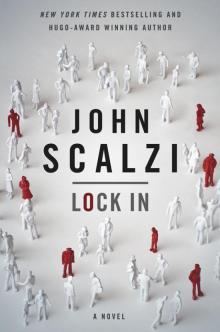 Lock In
Lock In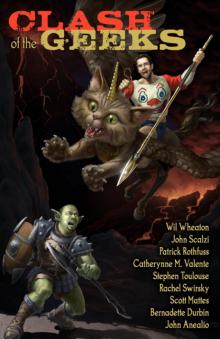 Clash of the Geeks
Clash of the Geeks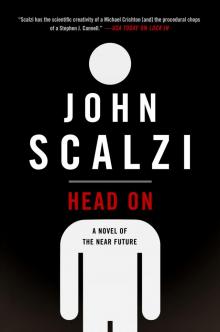 Head On
Head On The Dog King
The Dog King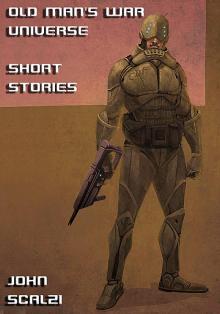 Old Man's War Universe: Short Stories
Old Man's War Universe: Short Stories The End of All Things
The End of All Things Tales From the Clarke
Tales From the Clarke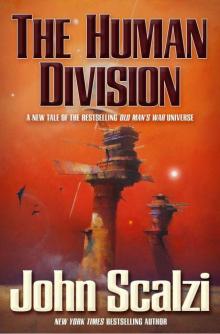 The Human Division
The Human Division The Android's Dream
The Android's Dream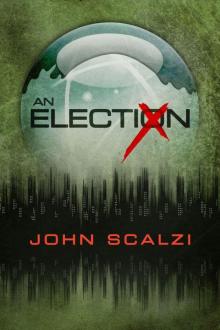 An Election
An Election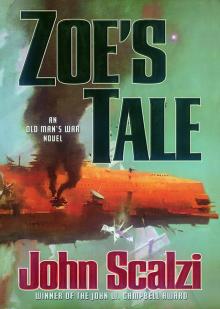 Zoe's Tale
Zoe's Tale Agent to the Stars
Agent to the Stars This Hollow Union
This Hollow Union The Gentle Art of Cracking Heads
The Gentle Art of Cracking Heads Old Man's War
Old Man's War The Tale of the Wicked
The Tale of the Wicked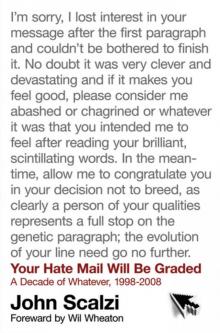 Your Hate Mail Will Be Graded: A Decade of Whatever, 1998-2008
Your Hate Mail Will Be Graded: A Decade of Whatever, 1998-2008 Judge Sn Goes Golfing
Judge Sn Goes Golfing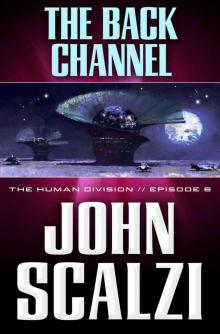 The Back Channel
The Back Channel The Human Division 0.5 - After the Coup
The Human Division 0.5 - After the Coup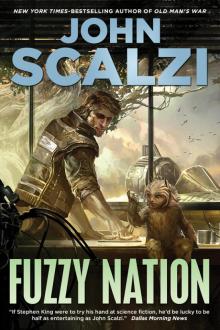 Fuzzy Nation
Fuzzy Nation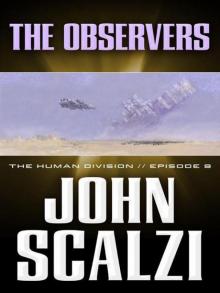 The Observers
The Observers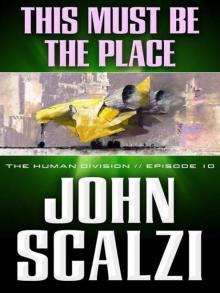 This Must Be the Place
This Must Be the Place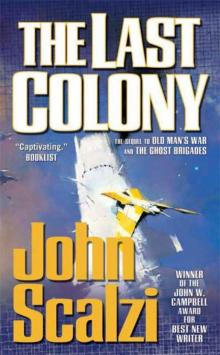 The Last Colony
The Last Colony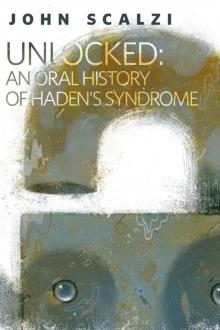 Unlocked: An Oral History of Haden's Syndrome
Unlocked: An Oral History of Haden's Syndrome A Voice in the Wilderness
A Voice in the Wilderness Redshirts
Redshirts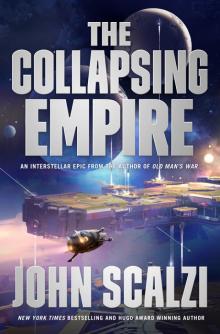 The Collapsing Empire
The Collapsing Empire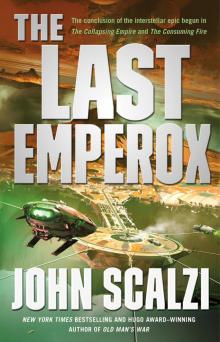 The Last Emperox
The Last Emperox The God Engines
The God Engines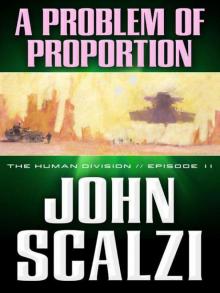 A Problem of Proportion
A Problem of Proportion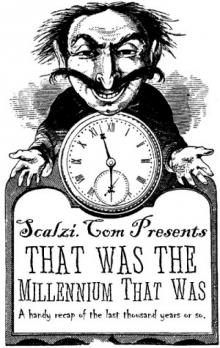 THAT WAS THE MILLENIUM THAT WAS
THAT WAS THE MILLENIUM THAT WAS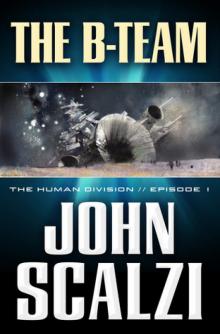 The B-Team
The B-Team The Sound of Rebellion
The Sound of Rebellion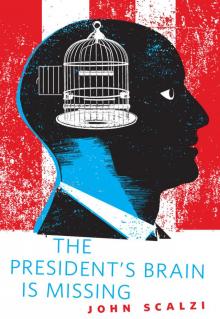 The President's Brain Is Missing
The President's Brain Is Missing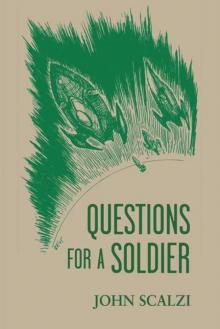 Questions for a Soldier
Questions for a Soldier Walk the Plank
Walk the Plank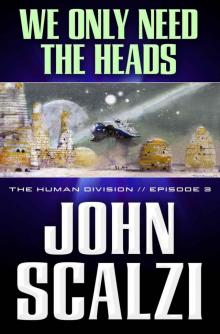 We Only Need the Heads
We Only Need the Heads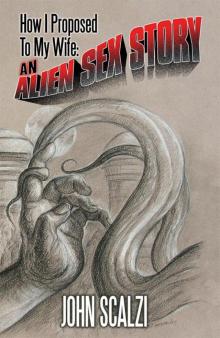 How I Proposed to My Wife: An Alien Sex Story
How I Proposed to My Wife: An Alien Sex Story Earth Below, Sky Above
Earth Below, Sky Above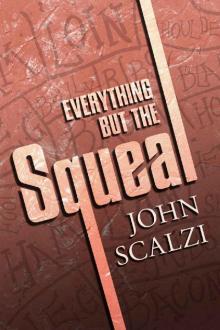 Everything but the Squeal
Everything but the Squeal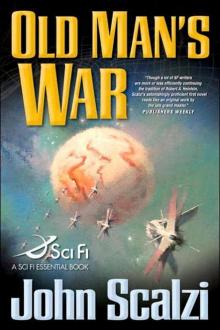 Old Man’s War
Old Man’s War The Human Division #12: The Gentle Art of Cracking Heads
The Human Division #12: The Gentle Art of Cracking Heads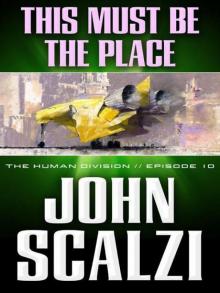 This Must Be the Place thd-10
This Must Be the Place thd-10 A Voice in the Wilderness thd-4
A Voice in the Wilderness thd-4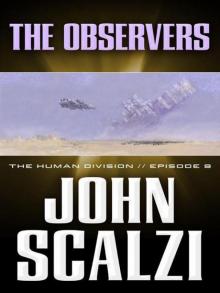 The Observers thd-9
The Observers thd-9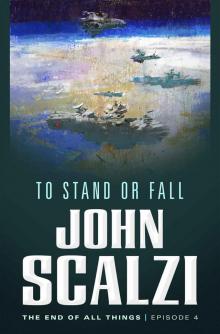 The End of All Things: The Fourth Instalment
The End of All Things: The Fourth Instalment Earth Below, Sky Above thd-13
Earth Below, Sky Above thd-13 Zoe`s Tale вбиос-4
Zoe`s Tale вбиос-4 After the Coup
After the Coup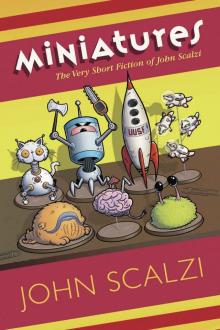 Miniatures: The Very Short Fiction of John Scalzi
Miniatures: The Very Short Fiction of John Scalzi The Last Colony вбиос-3
The Last Colony вбиос-3 Tales From the Clarke thd-5
Tales From the Clarke thd-5 Old Man's War omw-1
Old Man's War omw-1 The Human Division #8: The Sound of Rebellion
The Human Division #8: The Sound of Rebellion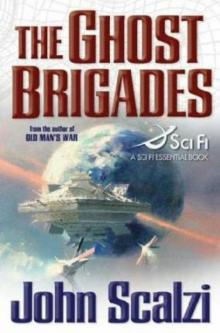 The Ghost Brigades omw-2
The Ghost Brigades omw-2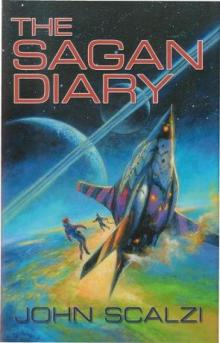 The Sagan Diary (old man's war)
The Sagan Diary (old man's war) The Sound of Rebellion thd-8
The Sound of Rebellion thd-8 The Human Division 13 - Earth Below, Sky Above
The Human Division 13 - Earth Below, Sky Above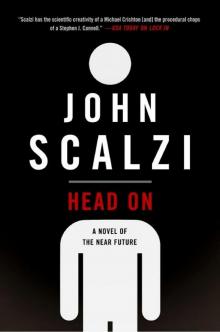 Head On_A Novel of the Near Future
Head On_A Novel of the Near Future The End of All Things: The First Instalment
The End of All Things: The First Instalment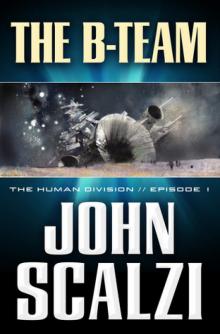 The B-Team thd-1
The B-Team thd-1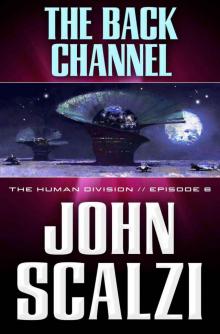 The Back Channel thd-6
The Back Channel thd-6 Walk the Plank thd-2
Walk the Plank thd-2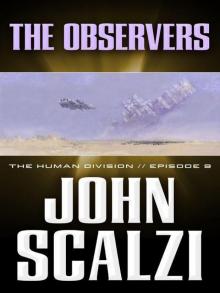 The Human Division #9: The Observers
The Human Division #9: The Observers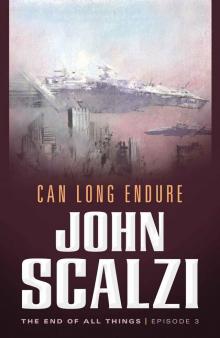 The End of All Things: The Third Instalment
The End of All Things: The Third Instalment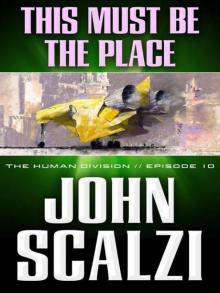 The Human Division #10: This Must Be the Place
The Human Division #10: This Must Be the Place The End of All Things #2: This Hollow Union
The End of All Things #2: This Hollow Union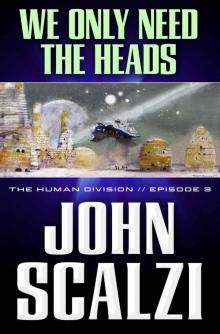 We Only Need the Heads thd-3
We Only Need the Heads thd-3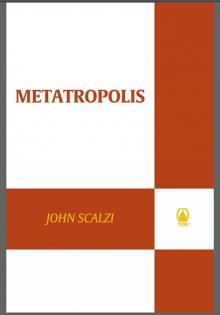 Metatropolis
Metatropolis The Dog King thd-7
The Dog King thd-7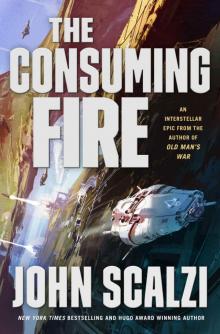 The Consuming Fire (The Interdependency)
The Consuming Fire (The Interdependency)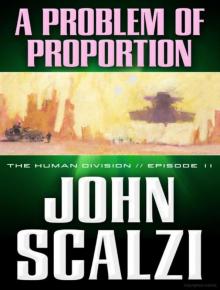 The Human Division #11: A Problem of Proportion
The Human Division #11: A Problem of Proportion